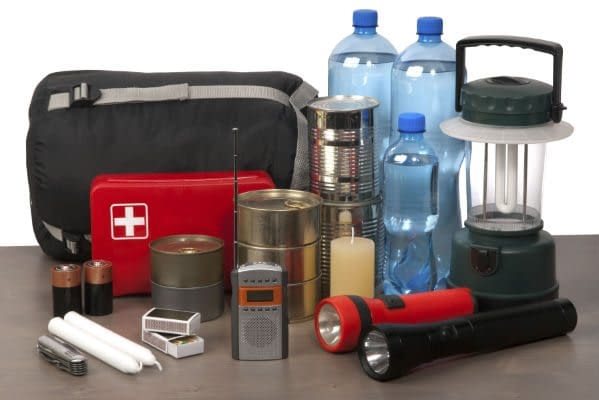
A storm system can do untold damage. Wind, rain, snow, and ice can leave a family without power or heat in a home that has sustained significant damage. Every family should keep a storm survival kit to stay safe while waiting for services to be restored. Need to know what to put in your storm survival kit? We have researched the basic items to keep in your kit, all of which you can buy locally. FEMA recommends you have enough supplies on hand to last for two weeks.
What to Keep in Your Storm Survival Kit
A disaster kit is a must, no matter where you live. You may need to take care of yourself if a serious weather system moves through the area; you cannot always count on local, state, or federal agencies to provide you with what you need, particularly when many people are affected. Here are the basics you should have on hand:
- Water: The federal government advises that we keep one gallon of water for every person in the home for at least three days, both for drinking water and to manage sanitation issues.
- Food: You need a good supply of non-perishable foods, such as protein bars or dried meals that are available at camping and outdoor stores.
- Baby Supplies: If you have a young baby in the family, ensure you have diapers and other baby items in good supply.
- First Aid Kit: A thoroughly outfitted first aid kit is extremely important. If a person in your family or a neighbor has been injured, first aid supplies are invaluable. You can purchase a kit that is already prepared, or create it yourself by purchasing standard first aid items you may need to stop bleeding or to disinfect cuts.
- Flashlights and Batteries: Being left in the dark is not fun. Keep working flashlights on hand, and ensure you have plenty of batteries. Replace batteries after a few years, and always recycle batteries rather than throwing them in the trash.
- Whistle: A whistle allows you signal for help. Keep several on hand and ensure your family members know where they are.
- Battery Powered Radio: You need news updates so you know what to expect in regard to further weather problems and the status of rescue efforts. You can purchase a hand-crank radio that allows you to generate power if batteries die.
- Canned Goods: Cans of food will come in handy, so keep a good supply of canned food and a manual can opener in your home.
- Dust Masks, Plastic Sheeting, and Duct Tape: You may need to protect your family against toxic fumes of various types after an explosion or other incident, and dust masks, tape, and plastic sheeting make it possible to close off openings or create a shelter if needed.
- Tools: You may need to shut off utilities, and you should have the tools on hand to do so. Make sure you check for escaping gas at once and shut it off. Your gas company representative can show you how if you aren’t sure.
- Wet Wipes and Plastic Garbage Bags: You may not have clean water, possibly for days. To stay clean, wet wipes are serviceable. Plastic bags can also be used for personal sanitation if needed.
- Cell Phone, Portable Chargers, Solar Chargers: Your cellphone can be a lifeline – but not if it isn’t charged. You can buy a solar charger or carry portable chargers that can keep it functioning during and after a serious storm.
- Blankets: Mylar blankets take up very little space and can be a lifesaver. Keep several of these blankets on hand, along with sleeping bags and extra blankets for cold winter weather.
- Pet Food: If you have pets, make sure you have a supply of extra food and water for them.
- Medications: If you need medications, keep an extra supply on hand to protect yourself should a serious storm move into the area. Replace the medications when needed, as they have a specific shelf life. Talk to your doctor for more information.
- Camp Stove: You can cook on a camp stove if necessary, but you must be aware of the risks of fumes. Use camp stoves outside only, unless the model you have is approved for indoor use. Any camp stove that uses propane or liquid fuel must never be used indoors.
Your Personal Documents and Insurance Policies
We advise our clients to keep copies of their policies in a watertight package in a safe place. If your home is seriously damaged by a storm, you may need to access your home insurance and car insurance policies based upon the type of damage. Having easy access to your policies can be important. In the same safe place, keep birth certificates, passports, licenses, and other valuable documents.
A Safety Plan
Have a safety plan for your family that you all agree upon and understand, such as where to meet and how to connect with each other if separated. This is important for every member of your family, including small children. Parents can place critical information on a label inside the shoes of young children who may be unable to remember an address or phone number.
In a time of need, you can often count on neighbors to come to your aid – or you may be called upon to help your own neighbors. As a local agency with all of our staff living right here, you can rely on us to be available to help you as well. Call us to review your existing policies, or to discuss any concerns about home insurance or auto insurance. We always watch out for the bottom line for our customers, and as a local agency, we are easy to reach. Call and let’s talk!



